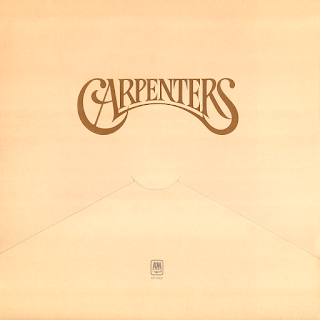Carpenters’ sophomore effort, Close To You, launched the siblings into superstardom. The one-two
punch of the #1 and #2 singles, “Close To You,” and “We’ve Only Just Begun,”
respectively, catapulted the duo into the public eye, and that breakthrough
album remains a fan, as well as a critical, favorite, landing high on Rolling Stone magazine’s list of “Top
500 Albums of All Time.” And deservedly so, but it was the album that followed,
the eponymous “tan album,” which is lesser-known today, that stands as
Carpenters’ highest-selling, non-compilation album, stateside. One might argue that the album’s stunning
sales figures were singularly due to inertia from the Close To You phenomenon, and that may well be a factor, but I argue
that the album, itself, contains some of the sibling’s best musical contributions
and reflects the flavor of pop music in 1971. Relevant sidebar: tapping into the spirit of early 1970’s pop music was a knack for which brother Richard singularly possessed, with few missteps, for four solid years between 1970 and 1973. He was the Kanye West of that moment in pop music history.
And to be sure, Carpenters
placed three of its singles into the top echelons of the charts that year,
starting with the Oscar winning “For All We Know,” #3, from the film, Lovers And Other Strangers, followed by the
classic Paul Williams/Roger Nichols track, “Rainy Days And Mondays,” #2, and the definitive
version of Leon Russell’s, “Superstar,” #2, a song, which had previously failed to
catch on, even after covers by “superstars,” Rita Coolidge and Bette Midler.
Karen’s sensual reading, recorded in just one take, delivered the perfect
rendering of heartbreak and unrequited love. The album reached #2 on the
Billboard album chart, went on to win a Grammy, that year, for “Best Pop Vocal
Performance – Duo or Group,” and perhaps most significantly, it introduced fans
to the indelible, now instantly recognizable band logo.
Hits aside, the album delivered two quintessential Carpenter
album tracks, a future commercial jingle, an obscure Henry Mancini composition,
one song that would most certainly have been a top 5 hit, had it been released
in 1971, one cringe-inducing moment, and one, extended track that may well be
their most perfect, musical moment. Here's the rundown:
Two quintessential
Carpenters album tracks:
- “(A Place To) Hideaway” - A perfect song for the siblings’ old-fashioned style, this sentimental song was written by Randy Sparks, the founder of the New Christy Minstrels and author of the 1970’s wedding standard, “Today.”
- “One Love” – Richard lifted a line from this song of heartbreak in the liner notes for the first posthumous Carpenters album, Voice Of The Heart, “Few are the choices we are given; the sands of time pass quickly by…”
Future commercial
jingle: “Saturday.”
When my partner and I moved to California a few years ago,
we heard, on a television commercial, an even perkier (believe it or not) cover of this already bubbly ditty
about the joys of Saturday. It’s one of the rare lead vocals by Richard and his
second best, after “I Kept On Loving You,” from Close To You.
As the story goes, in the late 1960’s, Henry Mancini’s
daughter, Felice, wanted to give her parents a unique gift for the holidays, so
instead of buying them a present, she wrote a poem about how much her family
meant to her. Her famous composer father loved it so much, that he set the poem
to music, and the siblings loved the resulting song so much, that they included
it on their third album. It might be the gentlest song I’ve ever heard.
Had it been released
in 1971, “Let Me Be The One” would have, most certainly, been a Top 5 hit.
Having a smash hit with “We’ve Only Just Begun,” by the third album, the duo
actively sought-out Roger Nichols/Paul Williams compositions for hits, and “Let Me Be The One” was strongly considered as a first-single off the sibling’s self-titled
LP. Richard has noted, over time, that he regrets not releasing this one as a
single, as he believes it would have easily been another top-5 hit in 1971. I’m
inclined to agree.
Cringe-inducing
moment: “Drucilla Penny.”
By this point in their career, Karen was the clear
lead-singer for band, yet, Richard still, apparently, felt compelled to deliver
the lead on a few songs on each album. Of all the songs Carpenter/Bettis might
have written together for brother Richard to record, why this one? Its
prissy, preachy, finger-wagging lyrics about groupies are just embarrassing (did
Carpenters even have groupies?). This track, no doubt, did little to help the duo with rock critics that year.
Before the siblings took over the world in the early 1970’s,
they were fledgling musicians signed to A&M Records. Burt Bacharach was a
fan of Carpenters’ version of “Ticket To Ride,” and he asked Herb Albert if the
duo would put together a medley of Bacharach/Hal David songs for a 1969
fund-raiser. This is the medley Richard arranged, and legend has it that it was
at this time that he was introduced to their break-through single, “Close To
You.” Ernesto Lechner, from Rolling Stone
magazine, indicated that the medley “…is arguably the group’s most impressive
moment – light and breezy, slightly jazzy, the work of two young idealists who
are still in love with life and its endless possibilities” (2004).
An apt description for both the medley and the entire album,
and while not their most critically acclaimed release, that award goes to A Song For You, the “tan album” captures
the duo at the most exciting moment in their lives and careers, both had just
begun, and that spring, it seemed like anything was possible for Karen and
Richard. And indeed, for the next few years in the early 1970’s, everything
they touched seemed to turn to gold.





No comments:
Post a Comment